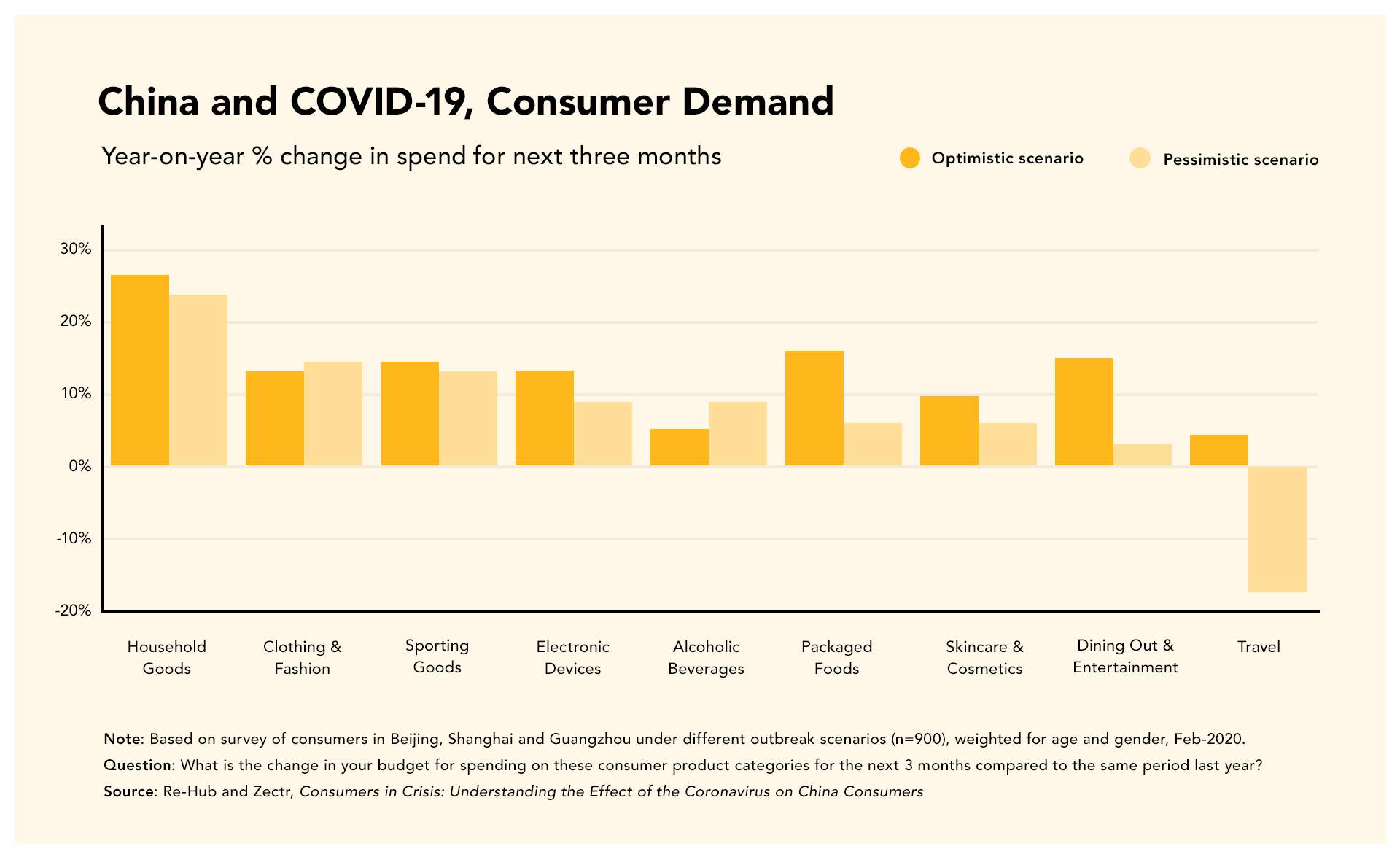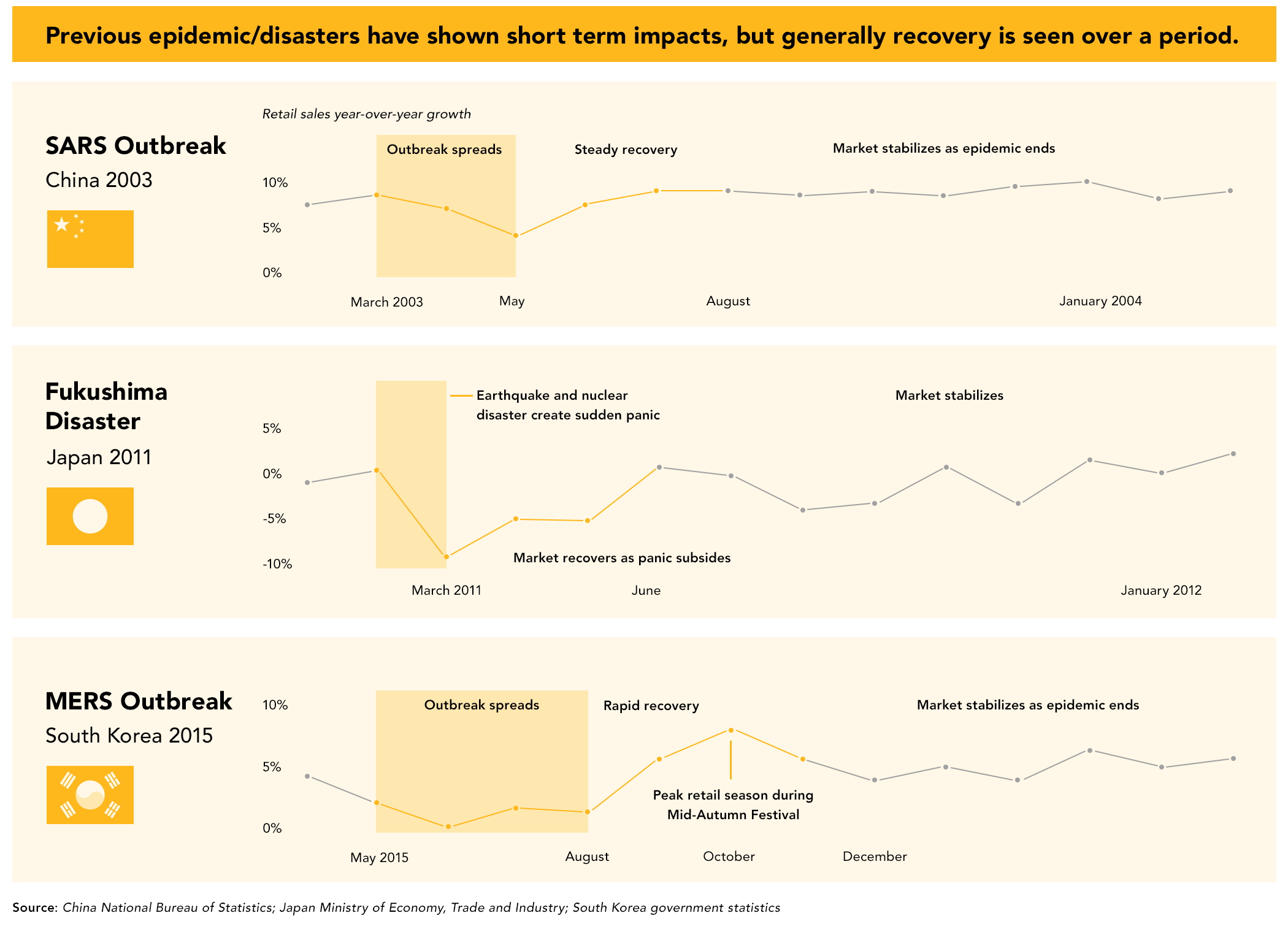covid-19 industry impact & predictions
On March 11, 2020, the World Health Organization officially changed its designation of the coronavirus from an epidemic to a pandemic. With its impact on the movement of people and goods, the future is decidedly uncertain.
Here at Causal IQ, our hearts go out to those affected by this pandemic. Without a doubt, this will have a real and lasting impact, altering the lives of people across the world. Economists are predicting a range of outcomes; from a quick recovery to a global slowdown, and in worst case scenarios, a pandemic-driven recession. Marketing outcomes follow a similar vein.
In Europe and the United States, transmission has been high, but thus far remains mostly localized (though this could change); partly because individuals, firms, and governments have taken strong countermeasures postponing or cancelling large events like SXSW, Broadway shows, Coachella/Stagecoach, March Madness/NBA, etc. early on, and more recently closing bars, restaurants, gyms, and entertainment venues.

According to James McDonald, Managing Editor for WARC Data, there are three possible scenarios regarding advertising budgets:
- Scenario one: spend is displaced but full-year growth is largely unaffected.
- Scenario two: spend is reallocated as brands focus on the short-term.
- Scenario three: severe disruption heightens the potential for an advertising recession.
Our assessment is that the outcome will likely be a mix of the first two scenarios. We certainly expect digital media consumption and ecommerce to increase as consumers look to keep themselves stocked up and entertained at home. Many have been shopping online, supplying advertisers with vital online research trends they can capitalize on.
Ad spending might fall, but we are increasingly seeing a shift as brands and advertisers reassess their approach, moving dollars away from lower funnel tactics in favor of running upper funnel messaging with us. Businesses are only as strong as the communities they are a part of, and businesses that stay close to their customers will continue to do well regardless of the current climate. Ford pulled national vehicle ads, replacing them with a coronavirus-response campaign. The spots plug a payment relief program and remind consumers how the company has responded during previous disasters.
“Due to the paused campaigns, the decreased competition for inventory is making this an efficient time to advertise and for brands to portray a message of solidarity” noted Causal IQ’s Vice President of Operations, Jennifer Laing. For example, we’ve had a few advertisers pause lower funnel DR campaigns, but many (including travel) requested we shift budget on their behalf in order to maintain market share, even as sales slow. There is a lot of opportunity within the QSR vertical to promote drive through and delivery orders. Businesses with long sales cycles are also looking to get in front of customers now, taking advantage of the increase in digital inventory. We are seeing political campaigns move more budget online to make up for the loss of typical door-to-door grassroots operations that typically dominate this time of year.
“We do have some advertisers requesting that we block content containing news about COVID-19, which as you can imagine is making delivery difficult on any websites that might cover news. Many websites beyond news content are also closely following this story, so the blocks are certainly driving up competition in areas that remain safe to deliver to.”
We understand our advertisers are reluctant to spend budget in a market where their expenditures might not result in near-term returns. Insurance, nutrition, sport and home supply categories look to grow in the mid- to long-term, but a combination of fear, closures and staff shortages present unique problems for travel, OOH entertainment, hospitality, and offline retail industries.
As reported by eMarketer, more than eight in 10 (85.6%) respondents ages 60 and older said they were likely to avoid shopping centers and malls. That’s not surprising says the author, given that COVID-19 has hit older people the hardest, but it may have an unintended consequence on their shopping habits (as it will on all consumers under quarantine).

According to research by Kantar, previous epidemic/disasters have shown short-term impacts, with the market stabilizing within a year. There is still a strong possibility that the virus could be contained in the coming months, allowing for a rebound in H2 2020.

Group M’s Brian Wieser observed, “With all of the appropriate caveats around the uncertainties of the situation, [Baidu – a Chinese Marketing Company] guided towards a change in ad revenue growth that was roughly 20% different vs. the growth rate observed during the fourth quarter. In short, there appears to be a basis for optimism around a resumption of normalcy – or at least a ‘new normal’ – in the coming months.”
The great news is that everyone is taking this very seriously. We are doing what we can do, and we will continue to practice extreme caution. The US is not the first country to be impacted, nor will it be the last. Now that the spread is slowing in China and nearing its peak in Italy, we have a sense of how this could play out elsewhere.
Our team remains committed and focused on providing you with the best service and expertise to support your business in the weeks and months ahead. While we have always prided ourselves on customer service and actionable insights, we will double down on our efforts to ensure that you can make the most of the difficult climate we find ourselves in today.
Thank you for your trust and your partnership,
The Causal IQ Family
Timeline of Events
Sunday, March 15: States and local governments begin instituting bans on bars, restaurants, gyms, and entertainment venues. Washington, California, Michigan, Boston, New York are among the first.
Friday, March 13: President Trump Declares National State of Emergency to combat COVID-19.
Wednesday, March 11: President Trump announced a 30-day ban on foreign travelers from many European countries beginning Friday at midnight.
- The World Health Organization (WHO) declared COVID-19 a pandemic. Read the WHO Director-General's opening remarks at the media briefing on COVID-19.
Tuesday, March 10: The Department of Labor issued new guidelines and recommendations for preparing workplaces for COVID-19. The CDC does the same.
Monday, March 9: The National Retail Federation tracks monthly imports and releases their research on the impact of coronavirus. Effect on imports expected to be larger and longer than previously expected.
- Retail, travel and franchise businesses meet with the White House to discuss tax relief for COVID-19.
Wednesday, March 4: The White House Office of Public Liaison sent an email with new Administration Resources and Information on COVID-19.
Tuesday, March 3: NRF has compiled a comprehensive list of travel restrictions. View here.
- EPA Releases List of Disinfectants to Use Against COVID-19
Saturday, February 29: Remarks are made by President Trump, Vice President Pence, and Members of the Coronavirus Task Force in a Press Conference. New travel restrictions were announced for Iran effective immediately.
Tuesday, February 21: The Centers for Disease Control and Prevention (CDC) held a conference call providing a status update on COVID-19. The recording is available here.
Additional Industry Resources
Coronavirus Considerations for Marketers
The outbreak of coronavirus in countries around the world is a widening tragedy. Many aspects of life and business will be altered in many countries around the world with the possibility of a recession realistic for many countries, at least on a short-term basis. Shifts in media consumption and other behaviors are important to monitor, and marketers need to be mindful of opportunities to service consumers that may follow along with the media owners they buy from and the societies in which they operate. Source: GROUP M
Working From Home During the COVID-19 Outbreak
eMarketer principal analyst Mark Dolliver and senior forecasting analyst Oscar Orozco discuss how digital adoption has made it possible—or not—for people to work, study and entertain themselves from home during the COVID-19 outbreak. Source: eMarketer
NRF CEO: How Retail is Faring Amid Coronavirus
CNBC’s “Power Lunch” team discuss the health of the consumer and how the retail sector is faring amid the coronavirus induced market sell-off with Matt Shay, NRF CEO. Source: CNBC
